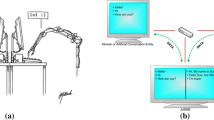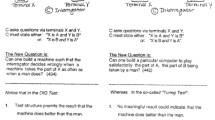Abstract
The abject failure of Turing's first prediction (of computer success in playing the Imitation Game) confirms the aptness of the Imitation Game test as a test of human level intelligence. It especially belies fears that the test is too easy. At the same time, this failure disconfirms expectations that human level artificial intelligence will be forthcoming any time soon. On the other hand, the success of Turing's second prediction (that acknowledgment of computer thought processes would become commonplace) in practice amply confirms the thought that computers think in some manner and are possessed of some level of intelligence already. This lends ever-growing support to the hypothesis that computers will think at a human level eventually, despite the abject failure of Turing's first prediction.
Similar content being viewed by others
References
Aristotle. Nichomachean Ethics, trans. W.D. Ross (1941) in R. McKeon, ed., The Basic works of Aristotle, New York: Random House, pp. 935–1126.
Block, N. (1981), Psychologism and Behaviorism, Philosophical Review XC, pp. 5–43.
Descartes, R. (1637), Discourse on Method, trans. R. Stoothoff (1985) in J. Cottingham, D. Murdoch and R. Stoothoff, eds., The Philosophical Writings of Descartes, Vol. 1, Cambridge: Cambridge University Press, pp. 111–151.
Dreyfus, H. (1979), What Computers Can't Do, New York: Harper Colophon.
Epstein, R. (1992), 'The Quest for the Thinking Computer', AI Magazine 13, pp. 81–91.
Keller, H. (1912), 'The Hand of the World', Out of the Dark: Essays, Letters and Addresses on Physical and Social Vision, Garden City, NY: Doubleday, Page & Co., pp. 3–17.
Keller, H. (1993), 'A New Chime for the Christmas Bells', Out of the Dark: Essays, Letters and Addresses on Physical and Social Vision, Garden City, NY: Doubleday, Page & Co., pp. 274–282.
Hauser, L. (1993), 'Why Isn't my Pocket Calculator a Thinking Thing?', Minds and Machines 3, pp. 2–10. Online: http://members.aol.com/lshauser/wimpcatt.html.
Landau, B. and Gleitman, L. (1985), Language and Experience: Evidence from the Blind Child, Cambridge, MA: Harvard University Press.
Loebner, H. (1994) 'In Response', Communications of the ACM 37, pp. 79–82. Online: http://www.loebner.net/Prizef/In-response.html.
MacNeil, R. and Lehrer, J. (l997), 'Big Blue Wins', NewsHour, May 12. Accessible online: http://www.pbs.orglnewshour/home.html.
Moor, J. (1976), 'An Analysis of the Turing Test', Philosophical Studies 30, pp. 249–257.
Putnam, H. (1975), 'The Meaning of “Meaning”', Mind, Language, and Reality: Philosophical Essays, Vol. 2, Cambridge: Cambridge University Press; Minneapolis: University of Minnesota Press, pp. 215–271.
Saygin, A.P., Cicekli, I. and Akman, V. (forthcoming), 'Turing Test: 50 Years Later.' Online: http://cogsci.ucsd.eduh/~asaygin/papers/tt50abs.html.
Searle, J.R. (1992), The Rediscovery of the Mind, Cambridge, MA: MIT Press.
Shieber, S.M. (1994), 'Lessons from a Restricted Turing Test', Communications of the ACM 37, pp. 70–78. Online: http://www.eecs.harvard.edu/shieber/papers/loebner-rev-html/loebnerrev-html.html.
Turing, A.M. (1950), 'Computing Machinery and Intelligence', Mind LIX, pp. 433–460.
Author information
Authors and Affiliations
Rights and permissions
About this article
Cite this article
Hauser, L. Look Who's Moving the Goal Posts Now. Minds and Machines 11, 41–51 (2001). https://doi.org/10.1023/A:1011262707720
Issue Date:
DOI: https://doi.org/10.1023/A:1011262707720




